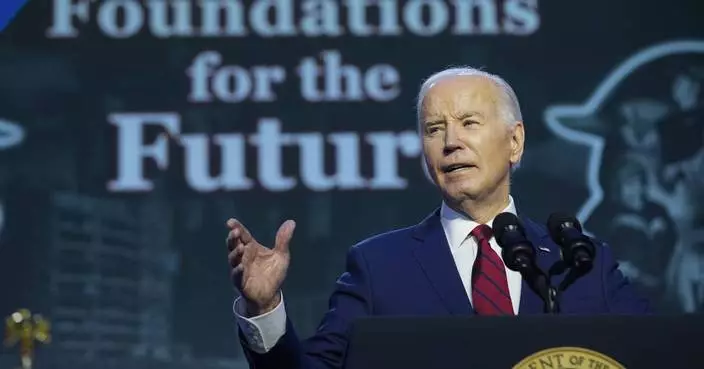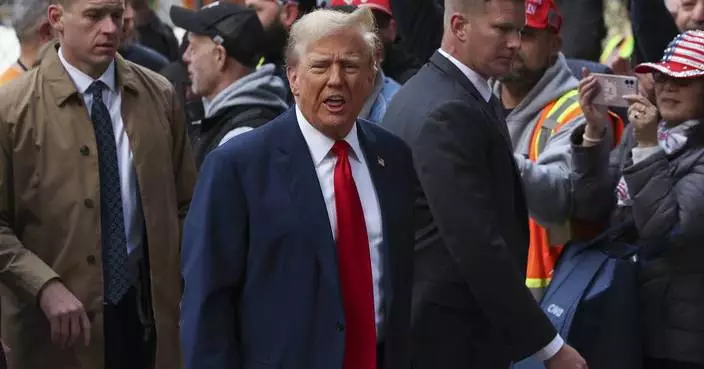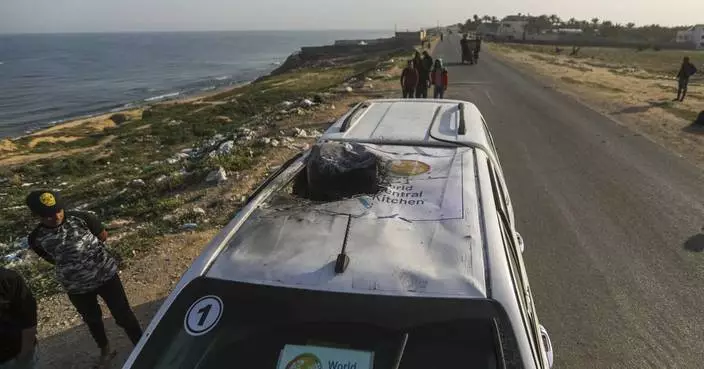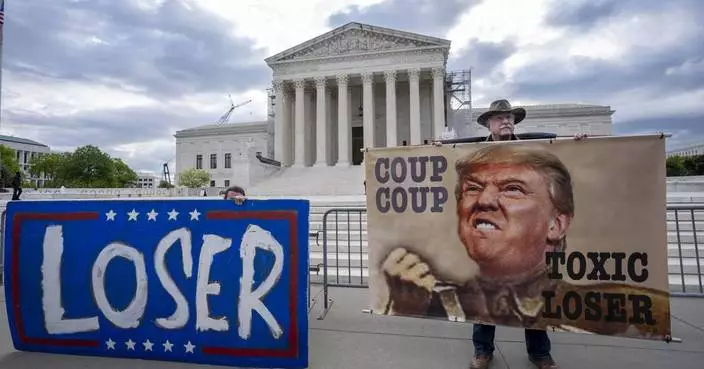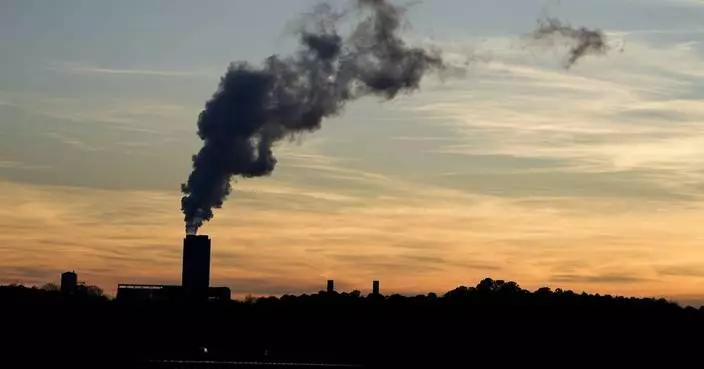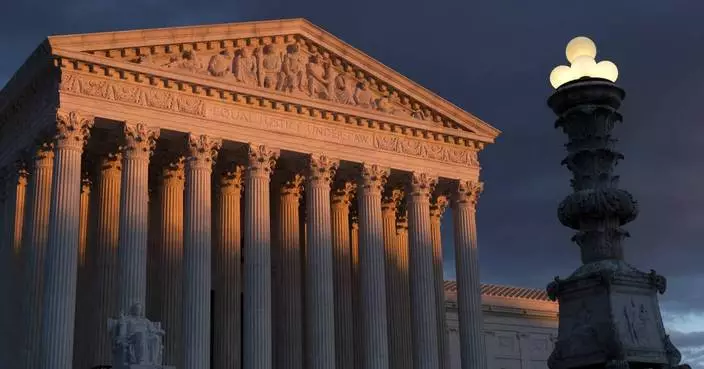President Donald Trump brought the world's two biggest economies to the brink of a trade war Friday by announcing a 25 percent tariff on up to $50 billion in Chinese imports to take effect July 6.
Beijing quickly responded that it would retaliate with penalties of the same scale on American goods — and it spelled out details to impose tariffs on 545 U.S. exports, including farm products, autos and seafood, according to the Xinhua state news agency.
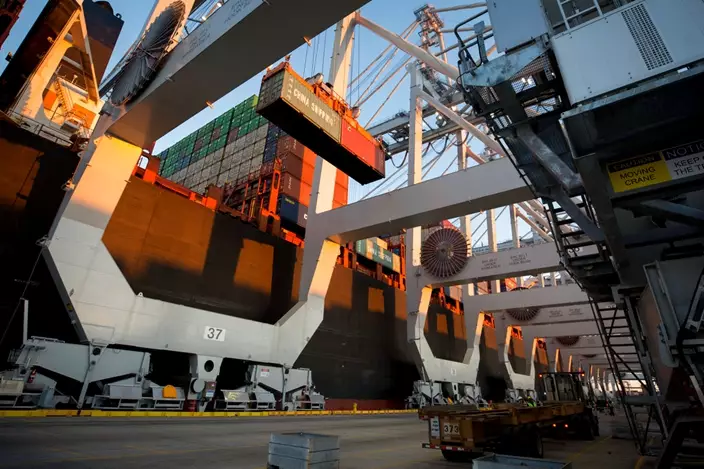
FILE- In this Jan. 30, 2018, file photo, a ship to shore crane loads two shipping containers together onto a vessel at the Georgia Ports Authority's Port of Savannah in Savannah, Ga. China's government renewed its threat Thursday, June 14, to scrap deals with Washington aimed at defusing a sprawling trade dispute as the White House prepared to release a list of Chinese goods targeted for tariff hikes. (AP Photo/Stephen B. Morton, File)
In announcing the U.S. tariffs, Trump said he was fulfilling a campaign pledge to crack down on what he contends are China's unfair trade practices and its efforts to undermine U.S. technology and intellectual property.
"We have the great brain power in Silicon Valley, and China and others steal those secrets," Trump said on "Fox & Friends." ''We're going to protect those secrets. Those are crown jewels for this country."
The prospect of a U.S.-China trade war weighed on financial markets Friday. The Dow Jones industrial average was down more than 220 points in mid-afternoon trading before recovering somewhat to finish down 84 points. Other stock averages also declined.
The U.S. tariffs will cover 1,102 Chinese product lines worth about $50 billion a year. Included are 818 items, worth $34 billion a year, from a list of 1,333 the administration had released in April. After receiving public comment, the U.S. removed 515 product lines from the list, including TVs and some pharmaceuticals, according to a senior administration official who briefed reporters on condition of anonymity.
The administration is targeting an additional 284 Chinese products, which it says benefit from Beijing's strong-armed industrial policies, worth $16 billion a year. But it won't impose those tariffs until it gathers public comments. U.S. companies that rely on the targeted imports — and can't find substitutes — can apply for exemptions from the tariffs.
The Trump administration has sought to protect consumers from a direct impact from the tariffs, which amount to a tax on imports. The tariffs target mainly Chinese industrial machinery, aerospace parts and communications technology, while sparing such consumer goods as smartphones, TVs, toys and clothes that Americans purchase by the truckload from China.
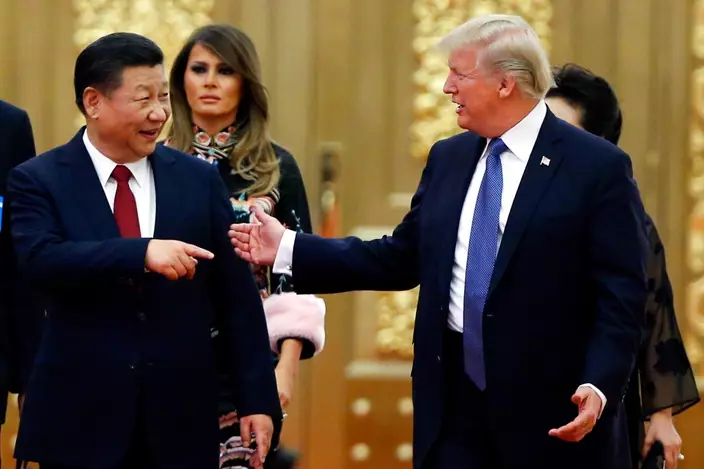
FILE - In this Nov. 9, 2017, file photo, U.S. President Donald Trump China's President Xi Jinping arrive for the state dinner with the first ladies at the Great Hall of the People in Beijing, China. Trump is closing in on a decision to impose punishing tariffs on tens of billions of dollars of Chinese goods as early as June 15, a move that could put his trade policies on a collision course with his push to rid the Korean Peninsula of nuclear weapons. Trump has long vowed to fulfill his campaign pledge to clamp down on what he considers unfair Chinese trading practices. But his calls for about $50 billion in tariffs could complicate his efforts to maintain China's support in his negotiations with North Korea. (Thomas Peter/Pool Photo via AP, File)
These tariffs will impose higher costs on U.S. companies that use the equipment. And over time, those costs could be passed on to consumers. But the impact won't be as visible as it would be if consumer products were taxed directly.
By contrast, the Trump administration earlier this year imposed steep tariffs on imported washing machines. By May, the cost of laundry equipment had jumped 17 percent from two months earlier, according to government data.
The administration characterized the tariffs it announced Friday as entirely proper.
"It's thorough, it's moderate, it's appropriate," U.S. Trade Rep. Robert Lighthizer said on Fox Business Network's "Mornings With Maria."
Lighthizer added, "Our hope is that it doesn't lead to a rash reaction from China."
But Beijing's Commerce Ministry retorted: "The Chinese side doesn't want to fight a trade war, but facing the shortsightedness of the U.S. side, China has to fight back strongly. We will immediately introduce the same scale and equal taxation measures, and all economic and trade achievements reached by the two sides will be invalidated."
A ministry statement gave no details of what U.S. goods would be hit by Beijing's retaliatory tariffs. But China in April had announced possible targets, including light aircraft, orange juice, whiskey, beef and soybeans — an economically and politically important export from America's heartland.
"The farmer can maybe look to their soybean associations for help to find other markets, but that doesn't happen immediately," said Dan Basse of AgResource, an agricultural research and advisory firm. "There's not much the farmer can do right now."
The longer-term concern, Basse said, is that China will increasingly look to Argentina and Brazil and that the United States will lose market share.
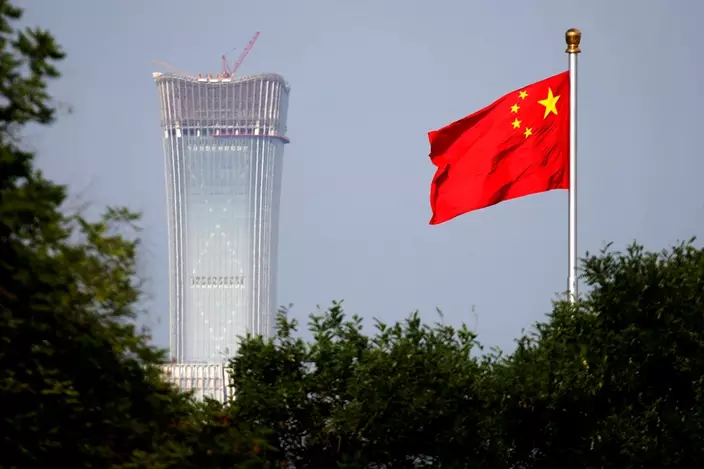
A Chinese national flag at Tiananmen Square flutters against the capital city tallest skyscraper China Zun Tower under construction at the Central Business District in Beijing Thursday, June 14, 2018. U.S. President Donald Trump approved a plan to impose punishing tariffs on tens of billions of dollars of Chinese goods as early as Friday, a move that could put his trade policies on a collision course with his push to rid the Korean Peninsula of nuclear weapons. (AP Photo/Andy Wong)
Trump has already imposed tariffs on steel and aluminum imports from Canada, Mexico and European allies, sparking anger and retaliatory threats from some of America's closest longtime allies. But his proposed tariffs against China risk igniting a damaging trade war involving the world's two biggest economies.
Trump's decision follows his summit with North Korean leader Kim Jong Un. The president has coordinated closely with China on efforts to pressure Pyongyang to eliminate its nuclear arsenal. But he signaled that whatever the implications for that or other issues, "I have to do what I have to do" to address China's trade policies.
By June 30, the administration is expected to finish writing rules to restrict China's ability to invest in U.S. technology.
Most of all, the U.S. tariffs are a response to China's attempts to supplant U.S. technological dominance, including outright theft of trade secrets and its requirement that U.S. companies share technology in exchange for access to the Chinese market.
The Trump administration has also argued that Beijing subsidies favored industries, encouraging them overinvest and overproduce. The result: China has flooded world markets in steel, aluminum, solar panels and products, thereby undercutting prices and putting foreign rivals out of business.
Wall Street has viewed the trade tensions with concern, fearful that they could strangle economic growth and undermine the benefits of the tax cuts Trump signed into law last year.
"Imposing tariffs places the cost of China's unfair trade practices squarely on the shoulders of American consumers, manufacturers, farmers, and ranchers," said Thomas Donohue, president of the U.S. Chamber of Commerce.
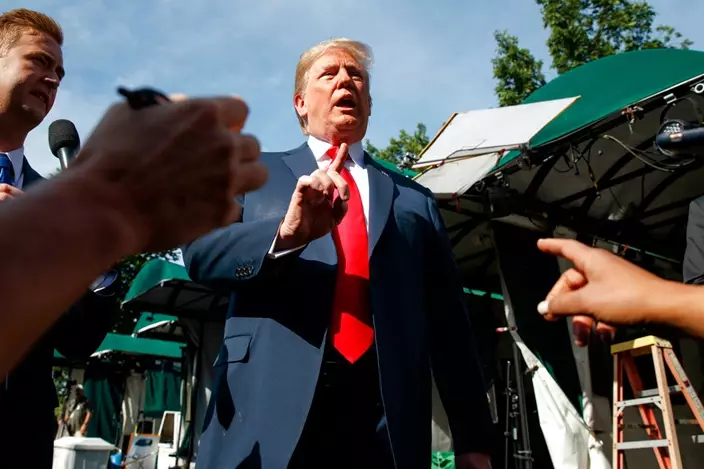
President Donald Trump speaks to reporters on the North Lawn of the White House, Friday, June 15, 2018, in Washington. (AP Photo/Evan Vucci)
Political reactions to Friday's announced tariffs cut across party lines. Senate Minority Leader Chuck Schumer, D-N.Y., said Trump was "right on target."
"China is our real trade enemy, and their theft of intellectual property and their refusal to let our companies compete fairly threatens millions of future American jobs," Schumer added.
But Rep. Dave Reichert, R-Wash., said he disagreed with the action because "Americans will bear the brunt instead of China."
NEW YORK (AP) — The third day of witness testimony in Donald Trump's hush money trial concluded Thursday after Trump's lawyers got their first chance to question a witness on the stand.
The trial resumed around the same time the U.S. Supreme Court heard arguments in Washington over whether Trump should be immune from prosecution for actions he took during his time as president.
At the trial in Manhattan, veteran tabloid publisher David Pecker took the stand after testifying previously about his longtime friendship with the former president and a pledge he made to be the “eyes and ears” of Trump’s 2016 presidential campaign.
The testimony was sought to bolster prosecutors’ premise that Trump sought to illegally influence the 2016 election through a “catch-and-kill” strategy to buy up and then spike negative stories. Key to that premise are so-called hush money payments that were paid to porn actor Stormy Daniels and former Playboy model Karen McDougal, along with the doorman.
Prosecutors say Trump obscured the true nature of those payments and falsely recorded them as legal expenses. He has pleaded not guilty to 34 felony counts of falsifying business records.
The case is the first-ever criminal trial of a former U.S. president and the first of four prosecutions of Trump to reach a jury.
Currently:
— No one is above the law. Supreme Court will decide if that includes Trump while he was president
— The National Enquirer was the go-to tabloid for many years. Trump helped change that
— Investigator says Trump, allies were uncharged co-conspirators in plot to overturn Michigan election
— Trump trial highlights: David Pecker testifies on ‘catch-and-kill’ scheme
— Key players: Who’s who at Donald Trump’s hush money criminal trial
— The hush money case is just one of Trump's legal cases. See the others here
Here's the latest:
The judge in Donald Trump's hush money trial on Thursday scheduled a hearing for Wednesday on prosecutors’ latest claims that Trump violated a gag order that bars him from making public statements about witnesses and jurors.
It’s unclear if Trump will need to attend Wednesday's scheduled hearing in New York. His campaign has already scheduled back-to-back rallies that day in Wisconsin and Michigan.
The court has adjourned for the day and the jury has left the courtroom.
Defense attorney Emil Bove grilled former National Enquirer publisher David Pecker on his recollection of specific dates and meetings, an apparent effort to underscore the difficulty of recalling details relevant to the years-old allegations at the heart of Donald Trump's hush money trial in New York.
After noting Pecker had mistakenly told a grand jury the wrong week that the former president was in New York City, Bove suggested: “There are times that there are gaps in your memory that you have to fill in with what you assume happened based on other events.”
Pecker rejected that premise. He later told Bove he’d met with Manhattan prosecutors between three and five times since the start of the year, as recently as a few weeks ago. He said his testimony was based on his “best recollection of the time.”
Defense attorney Emil Bove on Thursday traced former National Enquirer publisher David Pecker’s long relationship with Donald Trump early in his cross-examination during the former president's hush money trial in New York.
Bove showed how Pecker had flexed his power to help his friend long before the presidential election.
Bove said back in 1998, the former publishing executive tried to squelch a negative National Enquirer story about Trump’s then-wife Marla Maples. Though the story was published anyway, Pecker acknowledged he attempted to stop it.
“Seventeen years of providing President Trump with a heads up about potentially negative publicity?” asked Bove.
“That’s correct,” Pecker replied.
The reason for the long-running collaboration, Bove posited, was that Trump helped drive magazine sales — and Pecker wanted to maintain close access to him.
At one point in the 1990s, Pecker testified, the publisher launched Trump Style, a magazine built around Trump’s brand and real estate holdings.
Bove’s questioning also shed light on the origins of the term “catch-and-kill,” at least as it relates to Trump’s case.
“Before this investigation started, you had never heard the phrase ‘catch-and-kill,’ isn’t that correct?” Bove asked.
“Yes,” Pecker answered.
Donald Trump’s lawyers are getting their first chance to question a witness in the former president's hush money trial Thursday in New York.
Defense attorney Emil Bove opened his cross-examination of former National Enquirer publisher David Pecker by noting that he managed American Media Inc. to make money and asking about what Pecker has described as its “checkbook journalism.”
Pecker acknowledged that during his tenure, the tabloid and magazine publisher printed only about half the stories it bought — a fact the defense appears to be eliciting in order to suggest there was nothing unusual or criminal about the “catch and kill” operations involving claims about Trump.
Prosecutors wrapped up their questioning of former National Enquirer publisher David Pecker by asking whether he bears former President Donald Trump any ill will.
“On the contrary,” he said, “I felt that Donald Trump was my mentor. He helped me throughout my career.”
Although they haven’t spoken since the FBI began investigating the hush money arrangements several years ago — Pecker said he thought it would be inappropriate for them to communicate, given the probe — “I still consider him a friend,” Pecker said.
Trump looked on stoically as Pecker said so.
When asked earlier Thursday what he thought of Pecker's testimony, Trump said he was a “nice guy.”
The silver-haired, mustachioed former National Enquirer publisher David Pecker appeared at ease on his third day on the witness stand Thursday at Donald Trump's hush money trial, calmly bringing to life the machinations he says were involved in identifying and burying stories on Trump’s behalf.
He vividly recounted conversations he says he had with Trump and the former president’s onetime lawyer and henchman Michael Cohen. He recalled meetings at Trump Tower and a dinner at the White House.
He shed light on the inner workings of the Enquirer and the supermarket tabloid industry — and its use of “checkbook journalism” and “catch-and-kill” tactics — and the frantic race to pay off porn actor Stormy Daniels after the release of Trump’s infamous “Access Hollywood” tape.
Many of the details were previously known, but they’d been relegated to court papers and news articles. At Trump’s trial they have a narrator — a grandfatherly figure who made his living in the world of celebrity gossip.
The ex-publisher divided his focus between the jury and the prosecutor questioning him. Jurors looked on, often with rapt attention.
David Pecker, the former publisher of the National Enquirer, did not look at Donald Trump while walking by him on his way back to the witness stand at the former president's hush money trial Thursday in New York.
Pecker testified that Trump invited him to a White House dinner in July 2017 to thank him for helping the campaign — and asked for an update on former Playboy model Karen McDougal. The Enquirer had paid McDougal for the rights to her story claiming an affair with Trump and then kept it under wraps, Pecker testified earlier.
Trump was furious when McDougal gave an interview to CNN’s Anderson Cooper in March 2018, Pecker testified.
“I thought you had and we had an agreement with Karen McDougal that she can’t give any interviews or be on any TV channels,” Pecker testified that Trump told him by phone.
He said he explained to Trump that the agreement had been changed to allow her to speak to the press after a 2016 Wall Street Journal article about his tabloid’s $150,000 payout to McDougal.
“Mr. Trump got very aggravated when he heard that I amended it, and he couldn’t understand why,” Pecker told jurors.
Donald Trump waved his fist as he returned to the courtroom after a lunch break in his hush money trial in New York.
He did not respond to a shouted question about the U.S. Supreme Court, which heard arguments earlier Thursday in his bid to avoid prosecution over his efforts to overturn his 2020 election loss.
Meanwhile, the judge in the New York case signed an order setting in motion arguments, not necessarily immediately, over prosecutors’ request earlier in the day for more contempt findings against Trump.
Prosecutors had already asked the judge to fine Trump over 10 social media posts they say violate a gag order that bars him from making public statements about witnesses and jurors.
Thursday morning, they flagged four additional episodes, including comments at a press event earlier in the day about key witness David Pecker.
Former National Enquirer publisher David Pecker recalled Thursday a meeting with Donald Trump on Jan. 6, 2017, about two weeks before his inauguration, at which they discussed former Playboy model Karen McDougal.
The testimony came in Trump's hush money trial in New York shortly before the court broke for lunch.
As Pecker recalled it, Trump introduced him to a group of top aides as the National Enquirer owner and joked: “He probably knows more than anyone in this room.”
After dismissing the aides, Trump asked Pecker for an update on “our girl,” meaning McDougal, according to Pecker. The Enquirer had paid McDougal for the rights to her story claiming an affair with Trump, Pecker testified earlier.
Pecker said he reassured Trump that McDougal was keeping quiet, and Trump thanked him for handling the matters with McDougal and Dino Sajudin, the former doorman at one of Trump’s buildings who was also paid for his claims.
“He said that the stories were very embarrassing,” Pecker recalled.
Former National Enquirer publisher David Pecker recalled an irate Donald Trump calling him a day after The Wall Street Journal published an article shortly before the 2016 election.
Pecker's testimony came in his third day on the stand in Trump's hush money trial in New York, and as arguments at the Supreme Court in Washington in a separate case over Trump's presidential immunity were concluding.
The Journal article broke the news of the Enquirer’s $150,000 payment to Karen McDougal for the rights to the former Playboy model’s story claiming an affair with Trump.
“Donald Trump was very upset, saying, ‘How could this happen? I thought you had this under control. Either you or one of your people leaked the story,’” Pecker testified.
He said he told Trump that perhaps McDougal or someone connected with her had tipped off the Journal.
“Our call ended very abruptly. He didn’t say goodbye, which was very unusual,” Pecker testified.
Pecker testified that Enquirer owner American Media's response to the Journal that the company had “not paid people to kill damaging stories about Mr. Trump” was a lie.
“I wanted to protect my company, I wanted to protect myself, and I wanted also to protect Donald Trump,” Pecker explained on the witness stand.
The court broke for lunch shortly afterward. Trump left the courtroom without addressing reporters in the hallway.
Former National Enquirer publisher David Pecker was asked by a prosecutor Thursday in Donald Trump's hush money trial in New York about porn actor Stormy Daniels and her claim of a 2006 sexual encounter with Trump. The former president denies it happened.
On the stand, Pecker recalled the night after the public learned of the infamous “Access Hollywood” tape in which Trump discussed grabbing women sexually without asking permission, when the Enquirer's editor at the time called with an urgent matter.
The editor said he had heard from Daniels’ representatives that she was trying to sell her story and that the tabloid could acquire it for $120,000 if it decided right away, Pecker told jurors.
Pecker said he put his foot down, noting to the editor that the magazine was already $180,000 in the hole for Trump-related catch-and-kill transactions.
“I said we already paid $30,000 to the doorman, we already paid $150,000 to Karen McDougal,” Pecker recalled. “I am not a bank and we are not paying out any further disbursements or monies.”
At the same time, Pecker said, he told former Trump lawyer and fixer Michael Cohen that he should buy the story and “take it off the market” to avoid it getting out.
While jurors were on a break Thursday in Donald Trump's hush money trial in New York, both sides debated disputed exhibits that prosecutors want jurors to see.
Some of the disputed evidence, which the judge is keeping out of the trial for now, involved text messages then-National Enquirer editor Dylan Howard exchanged with a relative around the time of Trump’s 2016 election.
“At least if he wins, I’ll be pardoned for electoral fraud,” Howard said in one of the messages, which was read aloud in court by a prosecutor.
In another message, Howard informed his relative that Trump has “just been named president elect.”
The relative’s response — “Oh dear” — elicited laughter from the gallery when it was read in the courtroom.
The messages were not shown in court.
Trump’s lawyers argued the messages were hearsay, not business records, and couldn’t be used as evidence.
The jury then returned to hear more from former National Enquirer publisher David Pecker.
Former President Trump’s hush money trial in New York and his lawyers’ arguments about presidential immunity before the U.S. Supreme Court provided news outlets with an extraordinary split-screen moment Thursday.
“To put it plainly, there is a lot going on,” said MSNBC’s Jose Diaz-Balart shortly before the Supreme Court arguments started.
MSNBC, Newsmax and NewsNation concentrated fully on the Supreme Court arguments as they were taking place. As they began, Fox News Channel covered them with a small box on its screen giving a live view outside the Manhattan courtroom where Trump was on trial, but it quickly dropped the box.
CNN tried to capture both, its audio carrying the Supreme Court arguments, while a live written blog with details of what was going on in the New York trial took up about one-third of its screen.
The New York Times’ website carried live blogs of both trials side by side under the headline, “Keeping track of Trump’s legal woes.” News sites for both The Washington Post and The Associated Press also had two live blogs but gave the Supreme Court case more prominence than the hush money trial.
Trump left the New York courtroom after a break from the morning’s testimony, giving a thumbs up to reporters who shouted questions, but he didn’t say anything.
Former National Enquirer publisher David Pecker testified Thursday at Donald Trump's hush money trial in New York that he believes Trump was aware of a contract with Karen McDougal as she sought to sell her story about claims of an affair.
Asked by a prosecutor whether he knew if anyone other than former Trump lawyer and fixer Michael Cohen was aware of the Enquirer’s contract with McDougal, Pecker said: “I believe that Donald Trump did.”
Pecker testified he was leery of paying McDougal on Trump’s behalf because of trouble he ran into with an earlier arrangement benefiting Arnold Schwarzenegger during the movie star’s run for California governor in 2003.
McDougal’s contract gave American Media Inc., which owned the Enquirer and several fitness magazines, exclusive rights to her story on any relationship with a married man. Pecker said that clause was specifically about Trump.
Based on his experience with Schwarzenegger, Pecker said he “wanted to be comfortable that the agreement that we were going to prepare for Karen McDougal met all the obligations with respect to a campaign contribution.”
But he said the real purpose of the deal was to keep McDougal’s story from becoming public and potentially influencing the 2016 presidential election.
Former President Donald Trump listened intently Thursday at his hush money trial as longtime friend David Pecker testified in detail about the National Enquirer’s efforts to buy and kill unflattering stories related both to Trump and other celebrities.
He passed along notes to the two attorneys on either side of him.
Pecker testified that Karen McDougal demanded $150,000 — plus writing assignments and other business opportunities — for the rights to her story about claims of an affair with Trump. But according to Pecker, it wasn’t clear who was going to pay for it.
Pecker said Trump’s former lawyer and fixer, Michael Cohen, initially asked him to front the costs: “I said, ‘Michael, why should I pay? I just paid $30,000 for the doorman story. Now you’re asking me to pay $150,000 for the Karen story, plus all of these other additional items that she wants to do.’”
When asked how he would be reimbursed, Pecker said, Cohen assured him: “Don’t worry about it. I’m your friend. The boss will take care of it.”
Prosecutors asked the judge Thursday as former President Donald Trump's hush money trial resumed to consider whether he violated a gag order four more times with remarks he made outside court this week.
Among others, prosecutor Christopher Conroy flagged comments that Trump made just Thursday morning at an early-morning press event about David Pecker. Pecker, the former National Enquirer publisher who has been testifying as a prosecution witness, returned to the stand Thursday.
Trump had said Pecker has “been very nice,” which Conroy characterized as “a message to Pecker: Be nice." He argued that it’s also a message to other potential witnesses that Trump has a platform and will use it to attack them if they aren’t kind to him.
The judge hasn’t immediately ruled on Conroy’s request to hold Trump in contempt and levy “appropriate sanctions.”
Donald Trump’s motorcade arrived at the courthouse in lower Manhattan as his criminal hush money trial readied to resume Thursday.
After a morning campaign event in midtown, the former president returned to Trump Tower, then left again in the motorcade.
Addressing reporters in the hallway before court resumed, Trump began by speaking not about the trial, but instead the economy, griping about gas prices and the latest economic numbers.
He again addressed the Supreme Court, which is hearing oral arguments Thursday on whether he’s immune from prosecution in a case charging him with plotting to overturn the results of the 2020 presidential election.
“I would have loved to have been there,” Trump said.
Donald Trump, visiting construction workers for a campaign stop Thursday before heading to court in his criminal hush money case, was dismissive when asked about prosecutors' push for the judge to hold him in contempt of violating a gag order because of his social media posts.
“Oh, I have no idea,” Trump said when asked whether he would pay the $1,000 fine for each of 10 posts. He then said, “They’ve taken my constitutional right away with a gag order.”
Donald Trump is accused of falsifying internal Trump Organization records as part of a scheme to bury damaging stories that he feared could hurt his 2016 campaign, particularly as Trump’s reputation was suffering at the time from comments he had made about women.
The allegations focus on payoffs to two women, porn actor Stormy Daniels and Playboy model Karen McDougal, who said they had extramarital sexual encounters with Trump years earlier, as well as to a Trump Tower doorman who claimed to have a story about a child he alleged Trump had out of wedlock. Trump says none of these supposed sexual encounters occurred.
Trump’s former lawyer and fixer, Michael Cohen, paid Daniels $130,000 and arranged for the publisher of the National Enquirer supermarket tabloid to pay McDougal $150,000 in a journalistically dubious practice known as “catch-and-kill” in which a publication pays for exclusive rights to someone’s story with no intention of publishing it, either as a favor to a celebrity subject or to gain leverage over the person.
Prosecutors say Trump’s company reimbursed Cohen and paid him bonuses and extra payments, all of which were falsely logged in Trump Organization records as legal expenses. Cohen has separately pleaded guilty to violating federal campaign finance law in connection with the payments.
Donald Trump faces 34 felony counts of falsifying business records — a charge punishable by up to four years in prison — though it’s not clear if the judge would seek to put him behind bars.
A conviction would not preclude Trump from becoming president again, but because it is a state case, he would not be able to pardon himself if found guilty. He has repeatedly denied any wrongdoing.
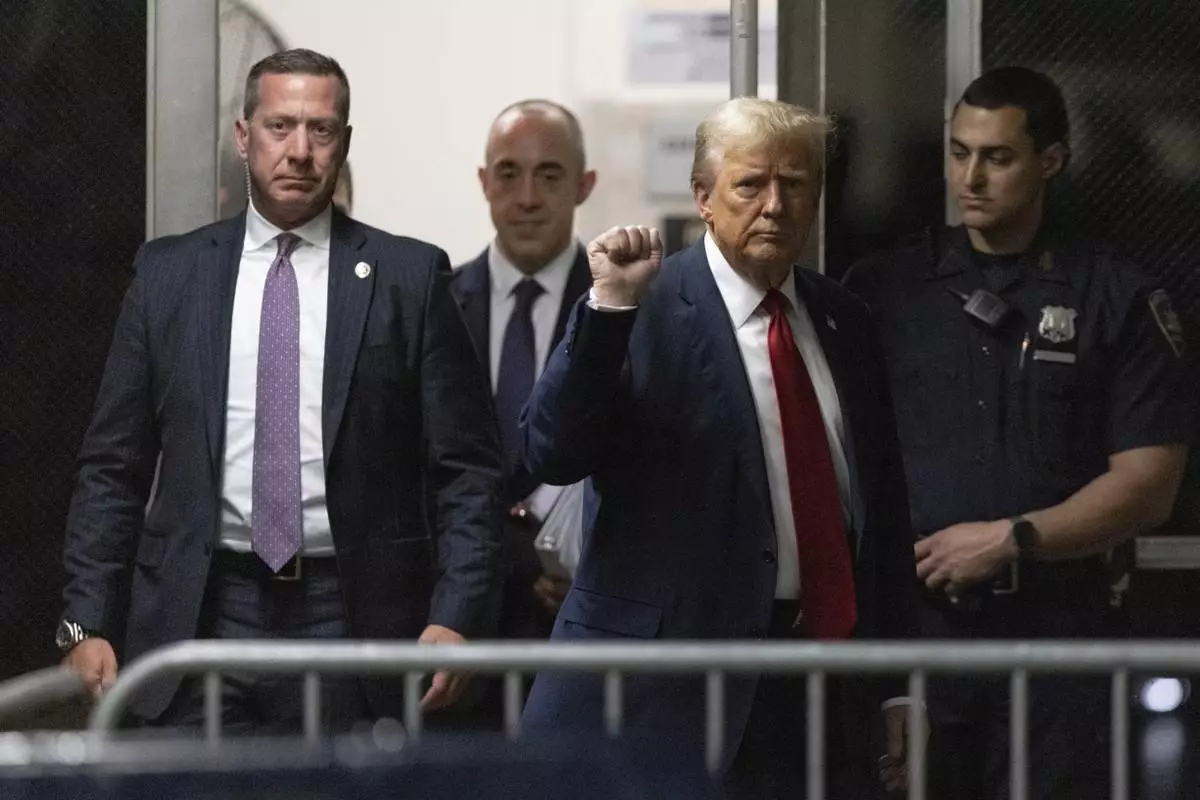
Former President Donald Trump returns from a break at Manhattan criminal court in New York, Thursday, April 25, 2024. (Jeenah Moon/Pool Photo via AP)
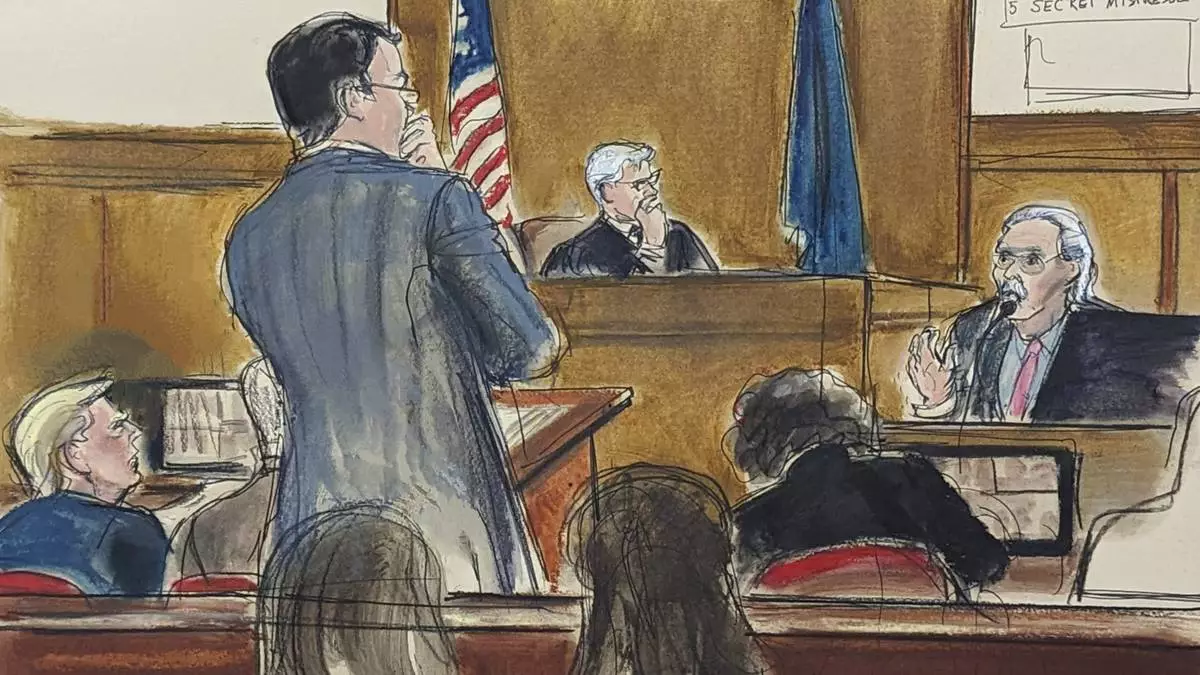
Former President Donald Trump, left, watches as David Pecker answers questions on the witness stand, far right, from assistant district attorney Joshua Steingless, in Manhattan criminal court, April 23, 2024, in New York. Testimony by the former National Enquirer publisher at Donald Trump's hush money trial this week has revealed an astonishing level of corruption at America's best-known tabloid and may one day be seen as the moment it effectively died. On Thursday, April 25, 2024 Pecker was back on the witness stand to tell more about the arrangement he made to boost Trump's presidential candidacy in 2016, tear down his rivals and silence any revelations that may have damaged him. (Elizabeth Williams via AP)
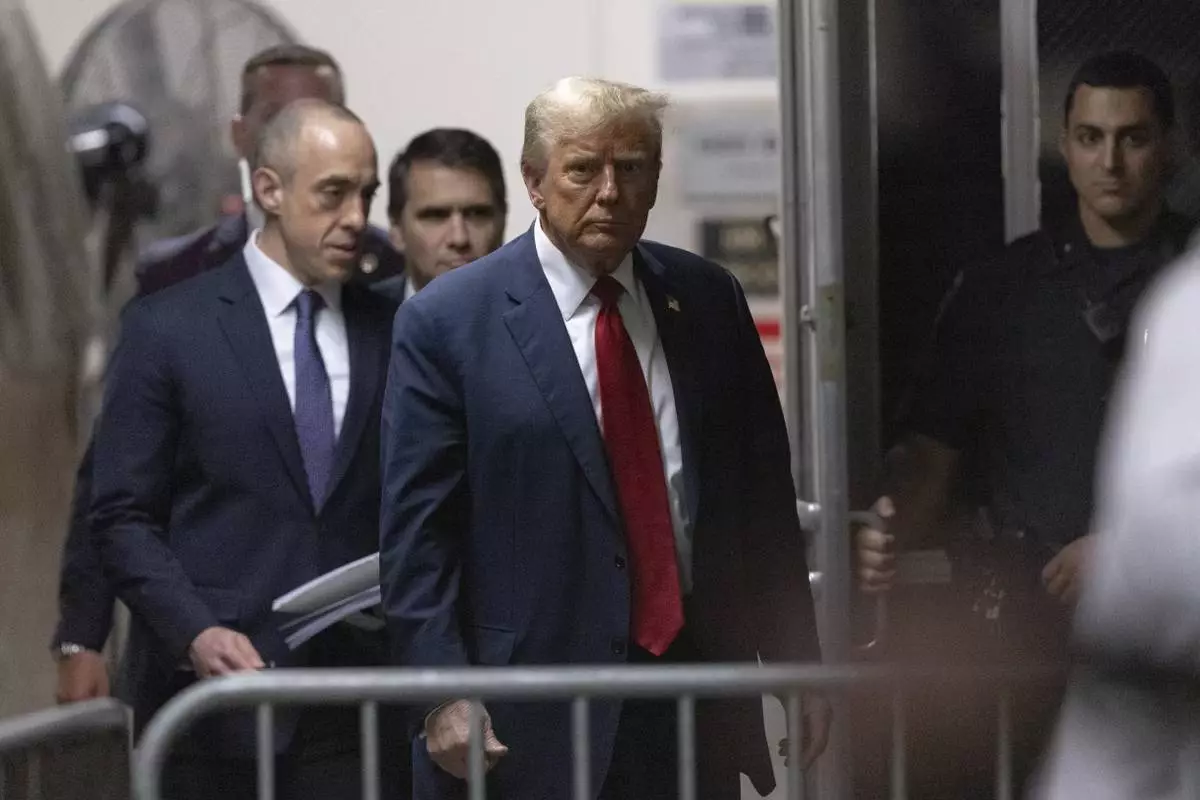
Former President Donald Trump returns from a break at Manhattan criminal court in New York, Thursday, April 25, 2024. (Jeenah Moon/Pool Photo via AP)
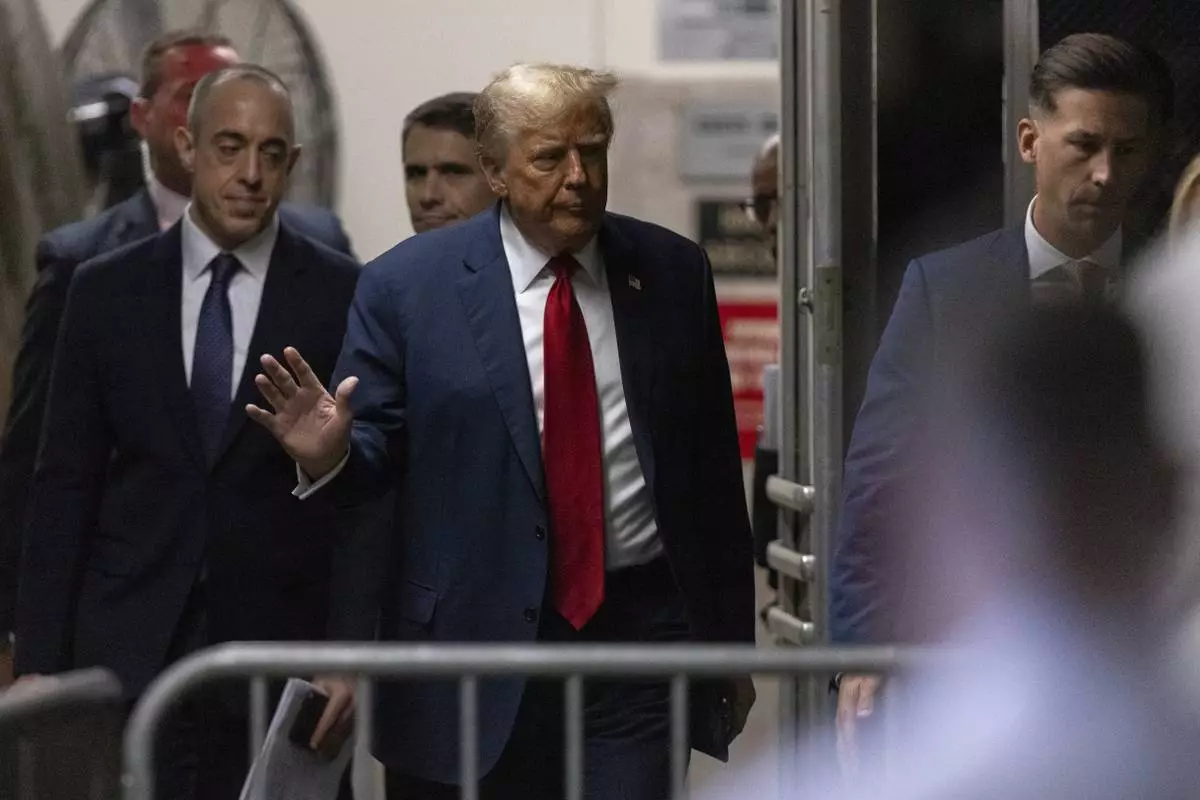
Former President Donald Trump returns from a break at Manhattan criminal court in New York, Thursday, April 25, 2024. (Jeenah Moon/Pool Photo via AP)
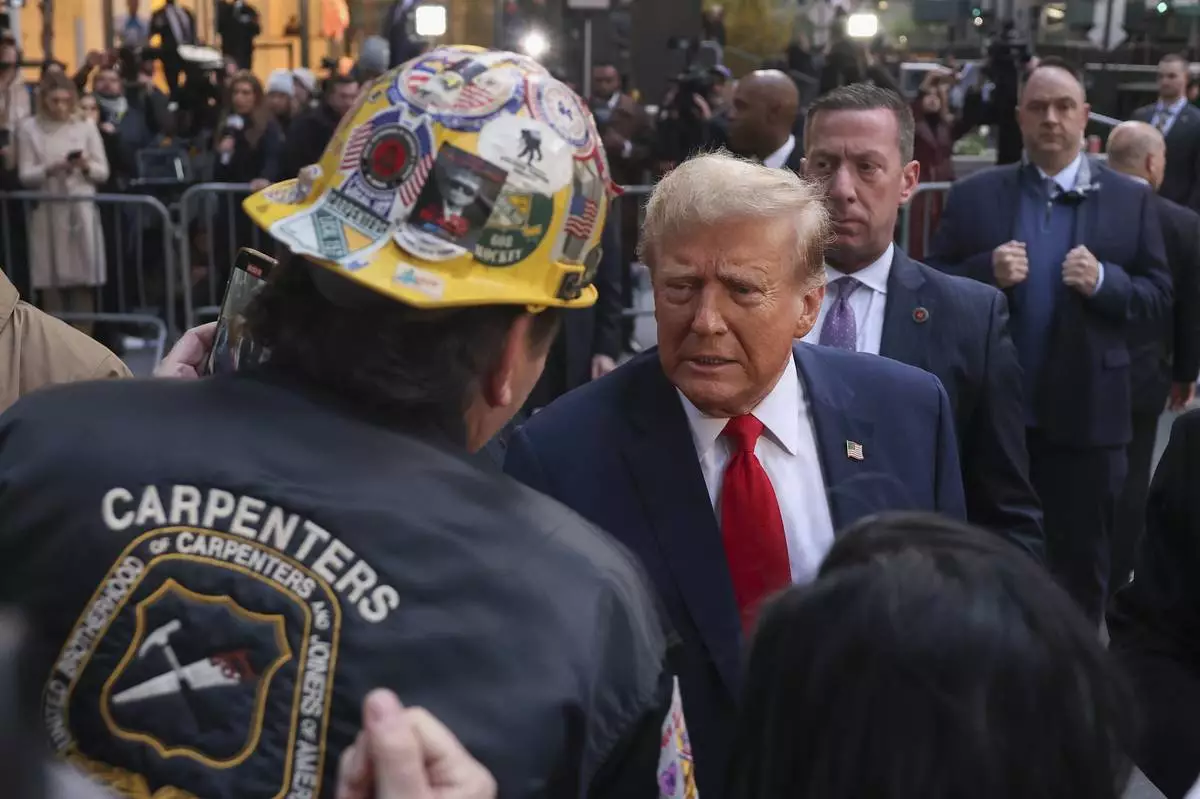
Former President Donald Trump speaks with construction workers at the construction site of the new JPMorgan Chase headquarters in midtown Manhattan, Thursday, April 25, 2024, in New York. Trump met with construction workers and union representatives hours before he's set to appear in court. (AP Photo/Yuki Iwamura)
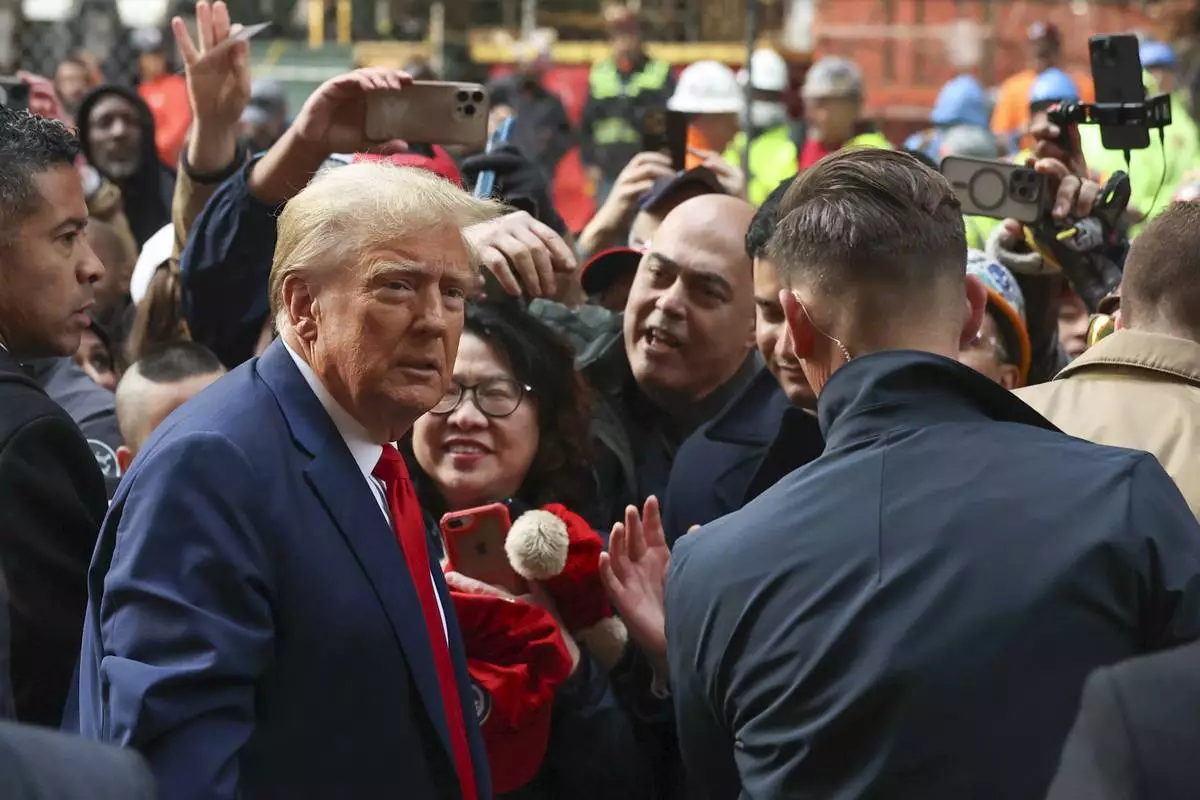
Former President Donald Trump speaks with union representatives at the construction site of the new JPMorgan Chase headquarters in midtown Manhattan, Thursday, April 25, 2024, in New York. Trump met with construction workers and union representatives hours before he's set to appear in court. (AP Photo/Yuki Iwamura)
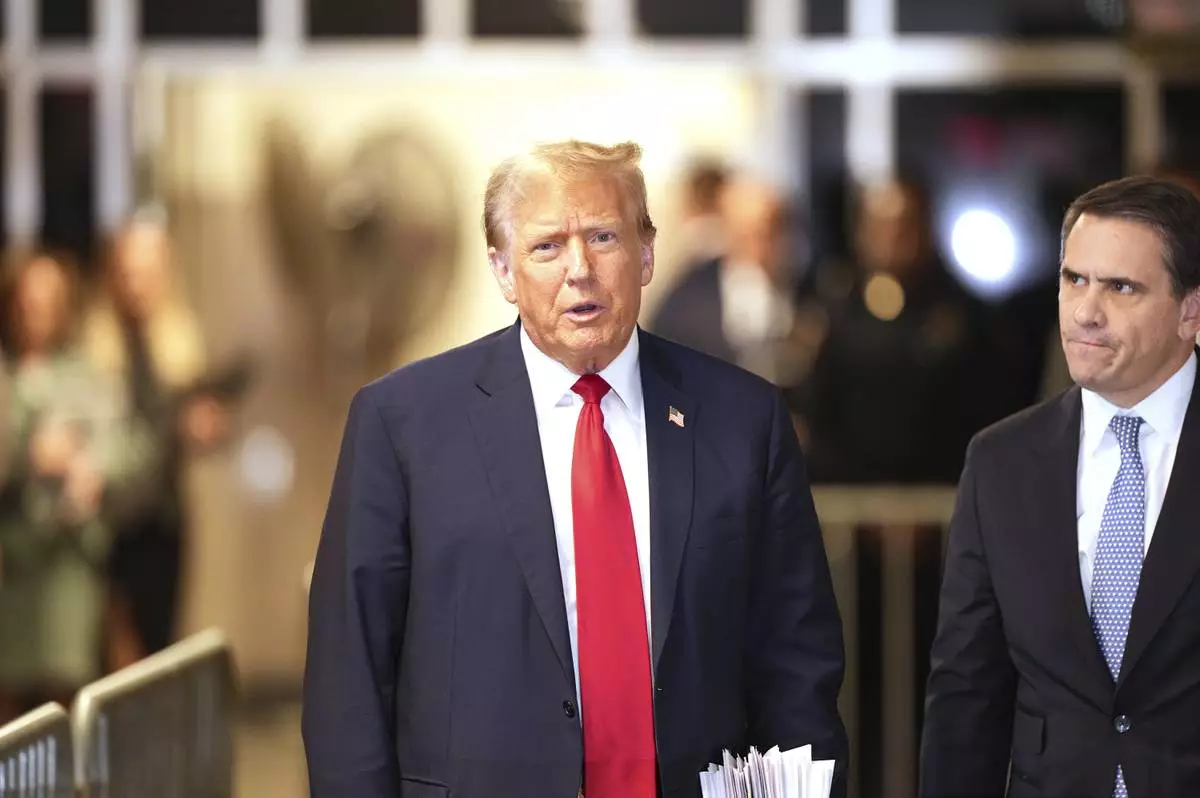
Former President Donald Trump leaves Manhattan criminal court on Tuesday, April 23, 2024 in New York. (Curtis Means/DailyMail.com via AP, Pool)
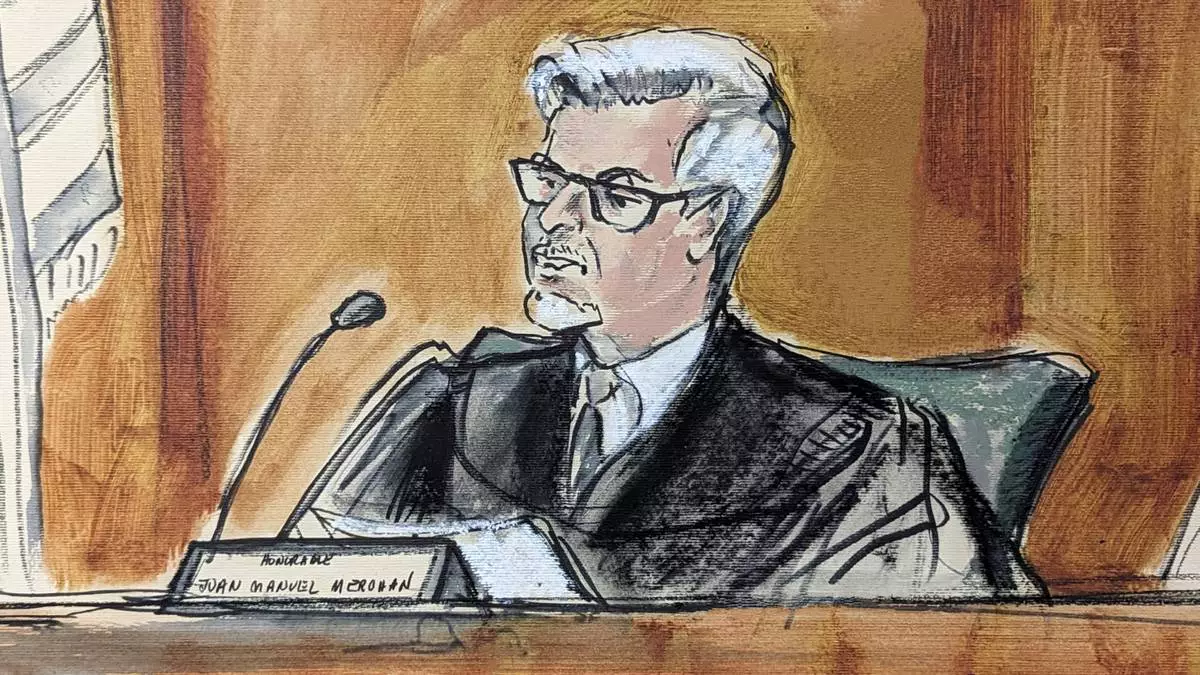
Judge Juan Merchan presides over Donald Trump's trial in Manhattan criminal court, Tuesday, April 23, 2024, in New York. (Elizabeth Williams via AP)
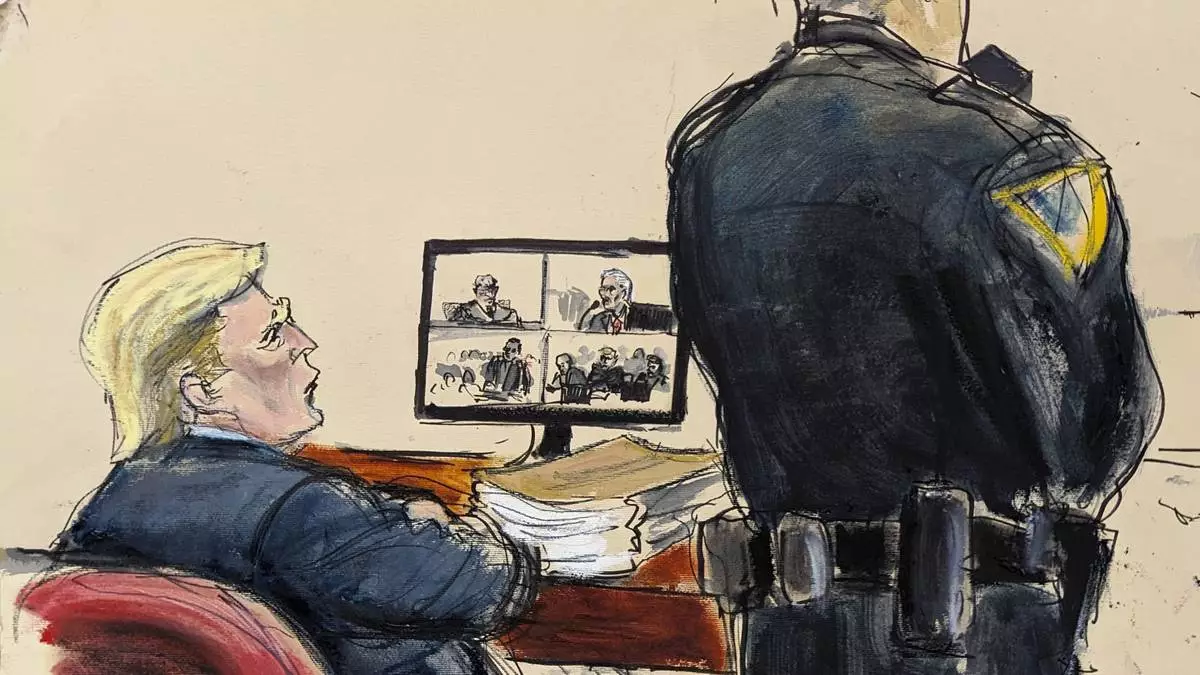
Former President Donald Trump sits at the defense table while David Pecker, shown on the video screen, testifies about Karen McDougal in Manhattan criminal court, Tuesday, April 23, 2024, in New York. (Elizabeth Williams via AP)
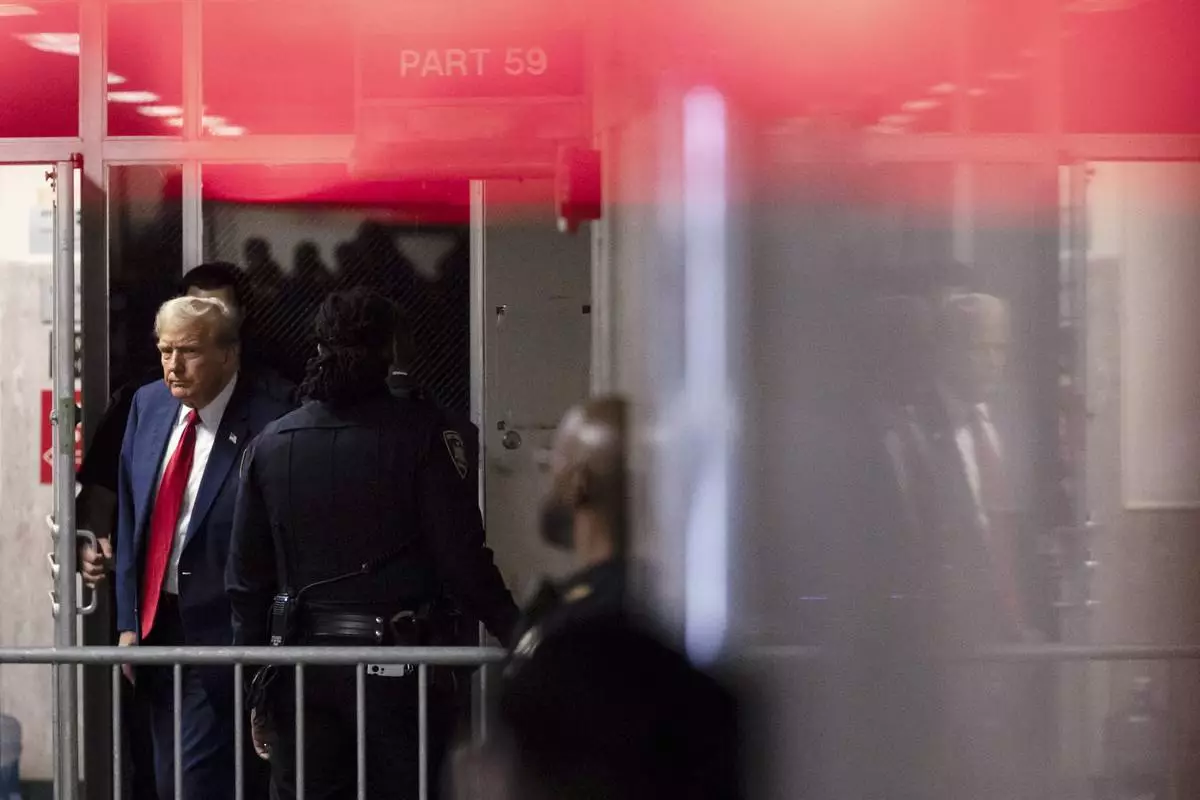
Former President Donald Trump leaves courtroom at Manhattan criminal court, Tuesday, April 23, 2024, in New York. (AP Photo/Yuki Iwamura, Pool)


















